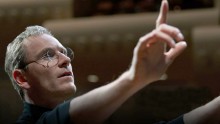The film is directed by Danny Boyle from England (Trainspotting, 28 Days Later, Slumdog Millionaire); the screenwriter is Aaron Sorkin, who has been awarded the Golden Globe, BAFTA, and Oscar for another IT drama Social Network (2010).
The story is composed of presentations of the three key creations of Jobs: the Apple II computer (1984), the NEXT “black cube” (1988), and finally iMac – a transparent block of plastic and circuits, which charmed everyone back in 1998.
The driving forces behind the drama are the relationships between Jobs (played by Michael Fassbender) and Chrisann (Katherine Waterston), the mother of his daughter Lisa, and between Jobs and the daughter (Perla Haney-Jardine, Ripley Sobo, Makenzie Moss at different ages), whom he initially refuses to recognize and then tries to control – refraining, however, from a true closeness. His antagonists in other persistent confrontations are: the patient assistant and confidant Joanna (Kate Winslet); John Sculley (Jeff Daniels), CEO of Apple (1983-93); Andy Hertzfeld (Michael Stuhlbarg), member of the Apple development team; Apple co-founder Steve Wozniak (Seth Rogen), whom Jobs half-affectionately and half-jokingly refers to as the “Rain Man” (an allusion to the eponymous film in which Dustin Hoffman has convincingly played an autistic character).
All these gunpowder tracks are ignited when necessary, and the sparks go to the desired temperature and brightness; Sorkin masterfully weaves conflicts into every plot twist and the dialogs are no less exciting than Tarantino’s shootouts. Actors are good at coping with this dramatic responsibility – especially Fassbender, who transforms on the exterior in every of the three episodes, but leaves the psychological core of his character unchanged. His character is a hard, even brutal corporate samurai – but he is also charismatic, dedicated to his vocation and sometimes not a stranger to empathy.
On the other hand, the visual side is rather hackneyed: rapid cuts, abundant flashbacks, the environment of chrome and glass, devoid of semitones and secrets, the sentimental finale – Boyle’s best days are long gone. If not for the screenplay, we would have another inspirationless typical office film.
No matter what the real Steve Jobs was. A viewer walks into a cinema hall longing for a good story – that is, one which is artistically true. And we got such a story from Sorkin, who knows his trade no worse than Wozniak and his unbearable companion knew computers.








